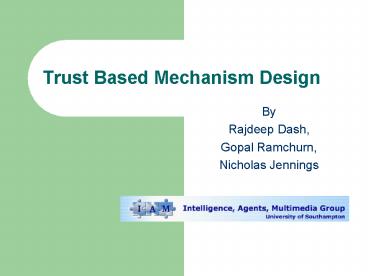Trust Based Mechanism Design PowerPoint PPT Presentation
1 / 23
Title: Trust Based Mechanism Design
1
Trust Based Mechanism Design
- By
- Rajdeep Dash,
- Gopal Ramchurn,
- Nicholas Jennings
2
Goal
- Fuse the fields of trust-modelling and mechanism
design - Mechanism design concerns itself with the
allocation of resources. - Trust measures how good an interaction partner is
according to personal experience and its
reputation
3
Deciding on a service provider
Garage X is better than Y
1
2
Jo
Anna
3
Anna
Garage Y is better than X!
Anna
Vanessa
4
Motivation
1
Which garage to choose to get the best price AND
my car repaired successfully?
2
3
Anna
5
Mechanism Design
- The design of systems of interacting agents
- Protocols (allocation payment schemes) to
ensure that certain global properties are
achieved at equilibrium (game-theoretic). - Selfish, rational agents possessing private
information i.e. each agent maximises its utility
function given its type.
6
Task Allocation
- Agent wants a task to be completed (e.g.
repairing a car). - Problem
- Who to allocate task to ?
- How much to pay task performer ?
- Solution
- Vickrey Clarkes Groves (VCG) mechanism
- (e.g. second price (Vickrey) auction)
7
VCG Mechanism
- Class of mechanisms satisfying
- Efficiency outcome maximising utility for all
agents - Individually rationality incentivise
participation - Incentive compatibility incentivise truthful
report - under dominant strategy
- Works by
- Allocation choose allocation maximising utility
- Payment charge marginal utility contributed by
agent
8
Applying VCG
Centre
(210,repair_car)
Allocate task to 1, 4 pays 1 50
Anna (4)
Ask(40,repair_car)
Ask(50,repair_car)
Ask(80,repair_car)
2
1
3
9
Cheapest not always best ..
10
Adding uncertainties
- Suppose that Anna has formulated a belief about
the Probability of Success (POS), ,of other
agents.
Agent i
1 40 0.525 70.25
2 80 1.0 130
3 50 0.85 128.5
Chose allocation that maximises expected utility,
11
Trust
- So far ones own experience, .
- Would be better to factor in others experiences,
, as well. - First time agent
- Greater pool of experience for seasoned user.
- Trust a way of aggregating ones direct
experience with the reputation information
provided by others.
12
Our model of trust
2
- Each time a task is performed, record POS
- Publicly transmit the POS to other agents
- Trust
- Use a simple averaging function over reports from
all agents - Give more weight to more trusted referrals, or
agents with similar properties
Vanessa
Transmit POS
Anna
13
Incorporate Trust
Agent i
1 40 0.4 1.0 0.85 0.5 65
2 80 0.6 1.0 0.9 1.0 130
3 50 0.5 1.0 0.9 0.87 132.7
4 0.525 1.0 0.85 na na
VCG Fails!!
14
TBMD
(210,task1)
Centre
Trust model
Anna
3
1
2
4 transmits to centre -- value of task, observed
POS and trust model
1, 2, 3 transmit to centre -- cost of doing task
and observed POS
15
TBMD
(210,task1)
Centre
Trust model
Anna
3
2
2
1
3
16
TBMD
Centre
(210,task1)
Trust model
Anna
3
1
3
2
17
Trust Based Mechanism Design (TBMD)
- An individually rational and efficient ICDR
mechanism that can also select those agents that
are most successful at their task
18
Experimental Setup
- Set of buyers and sellers.
- Biased (but truthful!) report from seller.
- Buyers attach different levels of importance to
sellers report.
19
Results
K
KTBM
KTBM0.25
KVCG
KTBM0.5
KFTM
20
Conclusions
- Task allocation with uncertainty
- Only incentive-compatible, individually-rational
efficient reputation mechanism - Affords flexibility of context based trust
modeling with efficiency
21
End
- Any Questions?
rkd02r_at_ecs.soton.ac.uk
22
Our Case Study
- Task Allocation
- Some agents may perform some tasks
- for which they incur a cost Ci
- Others may ask for tasks to be performed
- for which they have a valuation Vi
- Eg. File-sharing on P2P networks, Selfish
Multi-Sensor Nets - BUT there exists some uncertainty!
- Agents may not perform tasks completely at times
i.e. there exists a probability of success (POS)
in executing a task
23
Trust-Based Mechanism
- Find the optimal allocation given all trust
reports - Find the optimal allocation with the trust report
of each agent taken out in turn.

